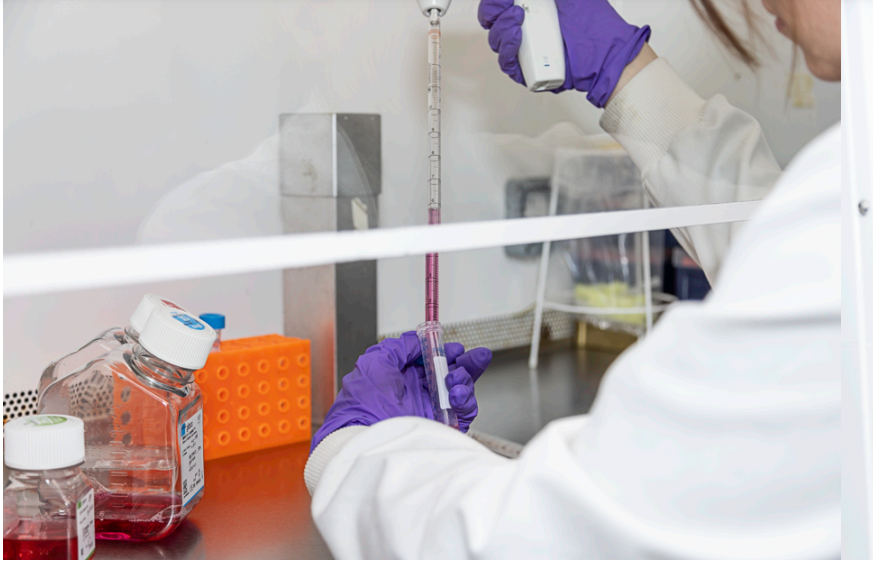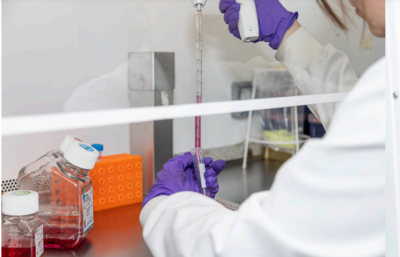

Cambridge researchers to improve treatment options for deadliest common cancer by understanding how it grows
Researchers at the University of Cambridge will use a new cutting-edge laboratory technique to study which proteins cause uncontrolled cell growth in pancreatic cancer and enable the devastating disease to spread rapidly. Through a new research project, funded by our organisation, the team aim to improve treatment options for the disease by discovering which genes and proteins drive its growth, then identifying ways to turn these proteins “off” and targeting them with drugs.
Pancreatic cancer is the deadliest common cancer, with more than half of people dying within three months of diagnosis, yet treatment options are limited because of decades of underinvestment in research. Surgery is the only potentially curative treatment, yet only one in 10 patients are diagnosed in time to receive it – and only three in 10 patients are able to have life-extending chemotherapy.
Over the 18-month long project, lead scientist Professor Jason Carroll and his team of researchers will use a new cutting-edge laboratory technique which they hope will uncover new proteins previously unknown to cause the progression of the disease. The team have successfully used this tool in breast cancer research projects and the results from these investigations have led to promising new clinical trials that are currently ongoing.
"Pancreatic cancer cells are notorious for dividing and multiplying incredibly fast, even in the presence of treatments, meaning the cancer can grow and spread rapidly, which is why so many are diagnosed too late for treatment. We hope to understand this process better, find out what proteins are involved and use this information to develop new drug targets that block these proteins."
Researchers hope to do the same for pancreatic cancer now. They aim to develop new treatment options for pancreatic cancer patients by understanding how each protein they have identified results in abnormal growth. They will then look to target these proteins with drugs that can turn them ‘off’ and consequently stop the cancer from growing and spreading.
We have invested £100,000 in the 18 month-long project through our Research Innovation Fund, which was created to support innovative and crucial research into the causes, treatment and detection of pancreatic cancer. Currently, just 3 per cent of the UK’s total cancer research budget is spent on pancreatic cancer resulting in barely any progress compared to other common cancers.
“It’s unacceptable that we have no other curative treatment options to offer patients than surgery, which tragically the majority won’t be eligible for due to their cancer being found too late."
The research at the University of Cambridge is one of eight promising new projects to receive a grant from our Research Innovation Fund. Grants are intended to help combat the cycle of underfunding which has hampered desperately needed progress on diagnosis, treatment and survival for pancreatic cancer. By funding cutting-edge projects, we help researchers take their work to the next stage of development and closer to much-needed breakthroughs. Since its creation, our Research Innovation Fund has awarded more than £3 million to research projects, which have gone on to attract more than £22 million of additional funding.
Lead researcher, Professor Jason Carroll said: “Pancreatic cancer patients currently have just one option when it comes to curative treatment and 80% of them are diagnosed too late to receive it. We need to do better for future patients. Pancreatic cancer cells are notorious for dividing and multiplying incredibly fast, even in the presence of treatments, meaning the cancer can grow and spread rapidly, which is why so many are diagnosed too late for treatment. We hope to understand this process better, find out what proteins are involved and use this information to develop new drug targets that block these proteins. I hope we can translate our success with breast cancer to pancreatic cancer and transform how the disease is treated in the future.”
Dr Chris Macdonald, Head of Research at Pancreatic Cancer UK, said: “Tragically, the majority of pancreatic cancer patients will hear “Sorry, we cannot do anything to help you” yet they are all desperate to try anything they can to get better. It’s unacceptable that we have no other curative treatment options to offer patients than surgery, which tragically the majority won’t be eligible for due to their cancer being found too late. Pancreatic cancer has been overlooked and underfunded for too long, leaving new treatments out of reach. We are on a mission to change this through our Research Innovation Fund and we can’t wait to see what Professor Carroll and his team uncover.”